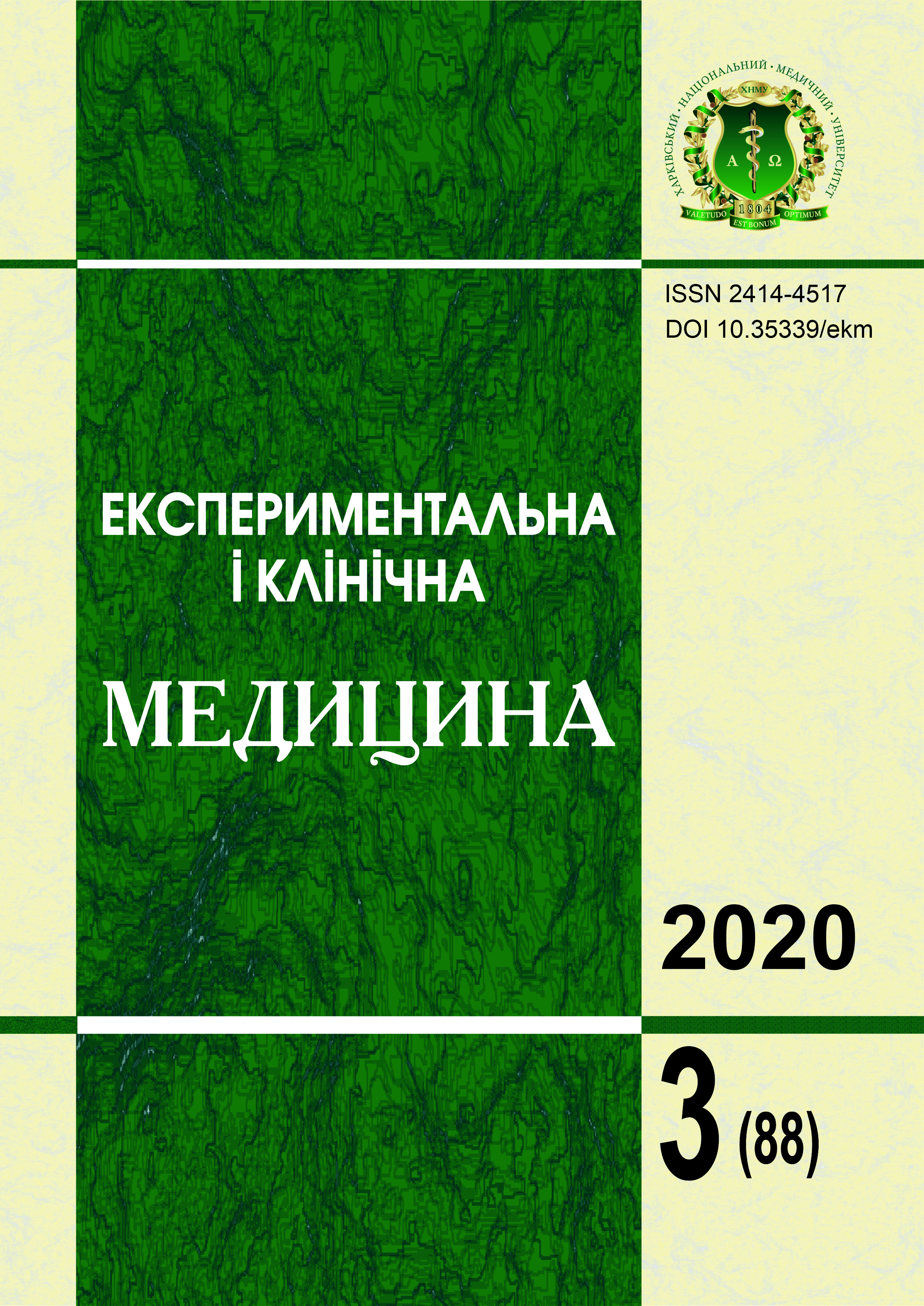Abstract
To solve this goal in compliance with the principles of bioethics and deontology conducted a comprehensive clinical-psychopathological and pathopsychological examination of 97 volunteers. Associated with the support of the military in the combat zone, not less than 1 year. Among those surveyed were 57 women and 40 men with a mean age (30.6±4.7) years. According to the results of the study, the clinical structure of post-stress disorders in the examined volunteers was represented by the following nosologies: F43.2 – adaptation disorders (32.7% of men and 28.1% of women), F43.1 – post-traumatic stress disorder (27.6% of men and 22.9% of women), F41.0 – panic disorder (22.4% of men and 29.1% of women), F41.1 – generalized anxiety disorder (17.3% of men and 19.9% of women). According to the scale of severity of traumatic stress, 62.8% of respondents have a complete manifestation and 37.2% a clear manifestation of stress disorder. According to the scale of anxiety depression and Hamilton depression, 56.2% of subjects had a severe depressive episode, 62.1% had a severe anxiety episode, 42.3% had a moderate depressive episode, and 33.4% had a moderate anxiety episode. It was found that for volunteers who survived the fighting are characterized by severe clinical manifestations of PTSD, with a high level of impact of the traumatic event was observed on all scales of PTSD; excessive signs of stress disorder, severe or moderate depressive and anxiety episodes on the Hamilton scale.
Keywords: PTSD, post-traumatic stress disorder, depression, anxiety, adjustment disorder, combat stress.
References
Maruta N.O., Markova M.V. (2015). Informatsiyno-psykholohichna viyna yak novyy vyklyk suchasnosti: stan problemy ta napryamky yiyi podolannya [Information-psychological war as a new challenge of modernity: the state of the problem and directions of its overcoming], Ukrainskyi visnyk psykhonevrolohii - Ukrainian Herald of Psychoneurology, 23(3(84)), pp. 21-28 [in Ukrainian].
Law of Ukraine «On volunteering» dated 19.04.2011 No.3236-VI (as amended). Information of the Verkhovna Rada of Ukraine, No.42, p. 435 [in Ukrainian].
Markova M.V., & Kozyra P.V. (2015). Poststresovidezadaptyvnistanynatlisotsialnykhzmin: analiz problem [Post-stress maladaptive states against the background of social change: analysis of the problem], Medychnapsykholohiia - Medical Psychology, 1(37), pp. 8-13 [in Ukrainian].
Hlaholych S.Iu., & Markova M.V. (2018). Stan psykhoemotsiynoyi sfery volonteriv, diyalnist yakykh povyazana z zabezpechennyam viyskovykh v zoni boyovykh diy [The state of the psycho-emotional sphere of volunteers, whose activities are related to the provision of military in the combat zone]. Psykhiatriya, nevrolohiya, medychna psykholohiya - Psychiatry neurology, medical psychology, 1(9), pp. 93-100 [in Ukrainian].
Komiievskyi О.A., & Horielov D.М. (2015). Ukrayinskyy volonterskyy rukhu konteksti svitovoho dosvidu [Ukrainian volunteer movement in the context of world experience]. Stratehichni priorytety - Strategic priorities, No.1, pp. 95-100 [in Ukrainian].
Lazos H.P. (2017). Osoblyvosti emotsiynykh staniv volonteriv-psykholohiv/psykhoterapevtiv u stosunkakh z postrazhdalymy [Peculiarities of emotional states of volunteers-psychologists/psychotherapists in relations with victims]. Osoblyvosti stosunkiv «psykhoterapevt-kliyent» и suchasnomu sotsiokulturnomu seredovyshchi - Peculiarities of relations «psychotherapist - client» in the modern socio-cultural environment. Z.H. Kisarchuk (Ed). Kyiv: Vydavnychyy Dim «Slovo», pp.154-176 [in Ukrainian].
Hlaholych S.Iu. (2016). Kliniko-sotsialni osoblyvosti dezadaptyvnykh staniv u volonteriv, diyalnist yakykh povyazana z zabezpechennyam viyskovykh v zoni ATO [Clinical and social features of maladaptive conditions in volunteers, whose activities are related to the provision of military in the ATO zone]. Psykhiatriya, nevrolohiya, medychna psykholohiya - Psychiatry neurology, medical psychology, 3(2(6)), pp. 69-76 [in Ukrainian].
Yurieva L.M., Shusterman T.Y., & Likholetov Ye.O. (2019). Nepsykhotychni psykhichni rozlady v osib, shcho zaznaly psykhosotsialnoho stresu v umovakh viyskovoho konfliktu [Nonpsychotic mental disorders in persons who have experienced psychosocial stress in a military conflict]. Medychniperspektyvy - Medical Perspectives, 24(4), pp. 112-120 [in Ukrainian].
Aimedov K.V., Asieieva Yu.O., & Tolmachov O.A. (2016). Suchasna diahnostychna kontseptsiya posttravmatychnoho stresovoho rozladu [Modem diagnostic concept of post-traumatic stress disorder], Arkhiv psykhiatriyi - Archive of Psychiatry, 22(2), pp. 128-129 [in Ukrainian].
Druz O.V., & Chernenko I.O. (2017). Napriamky medyko-psykholohichnoi profilaktyky poststresovykh psykhichnykh rozladiv u uchasnykiv lokalnykh boiovykh dii [Directions medical and psychological prevention post-traumatic mental stress disorders in local participants fi ghting], Ukrainskyi visnyk psykhonevrolohii - Ukrainian Bulletin of Psychoneurology, 25(1(90)), pp. 45-48 [in Ukrainian].

